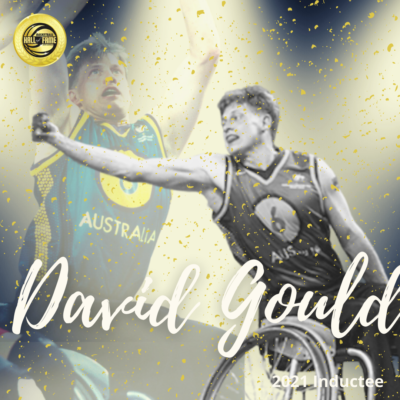Before there was Ben Simmons, before there was Lauren Jackson, before there was Andrew Gaze, Australian basketball already had a unique individual making his mark on the world stage – South Australia’s David Gould.
Already earmarked for an excellent career in the sport when he represented South Australia in a series of games against Victoria (and Andrew Gaze for that matter) in under 12s in 1976, David’s career was cut down by a shooting accident which left him a paraplegic.
But very little could deter David’s indomitable spirit. He turned to Wheelchair Basketball and was representing South Australia in 1982 at the age of 16.
He was selected in the Australian team in 1984 at the age of 19 and before he retired, David played in five Paralympics and five World Championships.
Clearly he was an exceptional talent, a truth reinforced with his selection in the World All Star Five at the 1994 World Championship.
Two years later he was selected in the World team to play against USA in a pre-Atlanta Games tournament.
But perhaps his greatest achievement was as co–captain in Atlanta of the 1996 Australian Rollers team which won Australia’s first ever gold medal at Olympic or Paralympic level.
Revered and respected worldwide, David represented Australia more than 550 times as a player or coach and his record within Australia is exemplary.
At national championships between 1982 and 1993, David led South Australia to titles in 1982-1986-1989-1990-1991, led the scoring at every tournament from 1984 to 1993, was the carnival MVP or Best and Fairest and/or won selection in the All Star Five at every championship.
With the advent of the National Wheelchair Basketball League (NWBL) Gould’s South Australian team, now known as the Adelaide Thunder, won the championship in 1993.
In 1994, with David now vice captain, the team went undefeated to the championship and he became the recipient of the Carlton United Disabled Sports Star Award.
As his Adelaide Thunder in 1995 won the NWBL championship for the third year in a row, David was voted the league’s Most Valuable Player.
Playing for South Australia at nationals in 1996, he was runner up as Most Valuable Player and Top Points Scorer, and selected in the All Star Five Team … and that was despite only playing in four of the tournament’s seven games.
Sidelined for most of the 1997 season due to an injury, David still finished runner up as Top Point Scorer, averaging 25.9 points per game, and once again was named part of the All Star Five.
In 1998, he was part of the South Australian 3X3 team that won a tournament in Himeji, Japan. Wherever he turned his hand, success followed.
As Adelaide Thunder captain in 1999, he again was the NWBL’s Top Points Scorer, Most Valuable Player and named to the league’s All Star Five, an accolade he also achieved in 1998 and again in 2000.
David’s level of singular dominance of a team sport and his ability to create success all around him is second-to-none, his list of achievements truly mind-boggling.
And this is just the tip of the iceberg.
As co-captain of the Rollers national team at the 1998 World Wheelchair Basketball Championships in Sydney where they finished fourth, and in the six-nation Roosevelt Cup tournament in the United States, where the Rollers finished sixth, his position as one of the all-time international greats in the sport stood out.
He carried the Olympic torch at the 2000 Sydney Paralympics and received an Australian Sports Medal for his “many years of service to the Paralympic movement as a basketball athlete.”
Retiring from playing international basketball after the 2002 World Championship in Kitakyushu, Japan, he naturally next turned to coaching – first with North Adelaide juniors – and by 2009, was coach of his beloved Adelaide Thunder.
In 2011, he became a full-time coach under the Australian Sports Commission Scholarship Coach Program, returning to the Paralympics the following year as an assistant coach of the Australian women’s national wheelchair basketball team, the Gliders.
They claimed silver at those London Games.
David coached the Women’s Under 25 team at the 2015 Women’s U25 Wheelchair Basketball World Championship in Beijing and in 2016, he was appointed Gliders’ coach, taking them to the 2018 World Championship.
Currently Basketball Australia’s Wheelchair Basketball Development Coach in South Australia, David’s career has been one of genuine and profound inspiration, turning what could have been a tragedy into a life’s work of dedication, hard work and success.
He is without doubt one of the state’s greatest and bravest sportspeople, and his ascension into Basketball SA’s Hall of Fame in its 2021 Class of Inductees is the culmination of a life of humility, of setting a great example, both motivational and inspirational.
